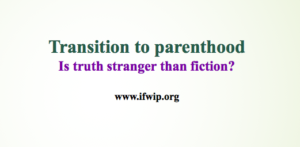The transition to parenthood is a time for significant change in a parent’s life. This could have a significant impact on the psychological wellbeing, parenting efficacy, and the couple relationship. In spite of the glaring scientific facts, this topic has remained a neglected part in the majority of the antenatal education programmes. This article briefly discusses the challenges and the factors that could influence the adjustments to the changes.

What is the transition to parenthood?
The transition to parenthood refers to the time which starts when the couple makes the decision to become pregnant and until the child is between 2-3 years old. (Ref)
In 1957, LeMasters first described that the transition to parenthood as a time for significant adjustments. (1)
Why could the transition to parenthood be challenging?
Parenthood is considered to be a satisfying and fulfilling experience. However, the transition to parenthood also brings a lot of challenges.
This requires adjustment to many changes especially with regards to sleep, lifestyle, identity (both personal and professional), relationship, responsibility, and social life/ leisure activities (such as hobbies, recreation, and socialising). (Ref)
Moreover, there could be a need for increased time for household chores, need to be available continuously for the childcare, less time for leisure, relaxation and self-care, and a feeling of restrictions/ being ‘trapped’. (Ref)
Working parents might need to change the working hours or leave their jobs to attain childcare responsibilities. This could lead to financial difficulties and concerns for career progression.
The transition to parenthood could result in: (Ref)
– Significant generalised stress
– Difficulties in the couple relationship
– Perinatal mental health illnesses
– Parenting stress
What causes Parenting stress?
This could arise due to the following reasons:
1) Self-criticism of their own parenting abilities
2) Difficult interaction with the child
3) A feeling of being trapped by childcare responsibilities.
How could the parenting stress be measured?
Parenting Stress Index-Short Form (PSI-SF) is commonly used to measure the degree of parenting stress. This is a short version of the original 120-item Parenting Stress Index (PSI) questionnaire. (Ref)
PSI-SF has three components: (Ref)
– Parental Distress (PD) subscale: This refers to the perception of stress level due to parenting.
– Parent-Child Dysfunctional Interaction (PCDI) subscale: This is the perception of the parents regarding the level of difficulty in interacting with the child
– Difficult Child (DC) subscale: This is the perception of parents on how difficult the child is to manage.
What factors could influence a smooth transition to parenthood?
Important factors for successful adjustment during this period are:
1. A robust social support and network. (Ref)
2. A supportive co-parenting relationship:
This is a great support for both new parents. Co-parenting refers to the mutual sharing of all parenting responsibilities. This has been shown to reduce stress and symptoms of depression, and improve parenting style and child development. (Ref)
3. Good temperament of the child:
Studies have shown that parents could have more stress and symptoms of mental health problems if the child has a challenging temperament. (Ref)
4. A strong couple relationship:
This helps to deal with the challenges of transition to parenthood more effectively, including the problems associated with a difficult child behaviour. (Ref)
What could be helpful during the transition to parenthood period?
Conventional antenatal education focuses mainly on the preparation for childbirth. There is usually a very little emphasis on the parenting skills and knowledge about the transition to parenthood.
The best intervention for achieving less stress and improved wellbeing during this vital period of life is sadly not known.
A Danish study (the NEWBORN Trial) showed that learning communication skills and knowledge about the changes in a couple relationship are helpful.
The following preventative programmes during the antenatal period have been evaluated in this regard with promising results:
3. Mindfulness-Based Childbirth and Parenting Education
4. Nurse-Family partnership programme.
Conclusion
Healthcare professionals and childbirth educators should provide adequate information on the challenges of transition to parenthood. Antenatal education should include the necessary skills to adapt to the changes and the challenges.
Reference
1. LeMasters EE. Parenthood as crisis. Marriage and Family Living. 1957;19:352–355.

